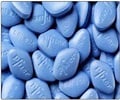Pfizer's Viagra was a blessing in disguise for the over 150 million around the world who silently suffered from the male sexual disorder called
Pfizer's Viagra was a blessing in disguise for the over 150 million around the world who silently suffered from the male sexual disorder called erectile dysfunction. Now, these men have a second hope with two new drugs introduced(and waiting for approval from the U.S. FDA) by the drug majors Eli Lilly and Bayer. The drugs, Cialis (tadalafil), by Eli Lilly, and Levitra (vardenafil), by Bayer, are touted to be more effective than Viagra(sildenafil citrate) as they are said to remain active in the bloodstream for longer periods, which means, men can have an erection for a longer period of time. According to the manufacturer's of the new drugs Cialis and Levitra are active for upto 24 hours, with 59 per cent of men reporting effects for upto 36 hours compared to Viagra, whose effect lasts for upto to three or four hours, with few men reporting effects upto 12 hours. The reason for the longer effect of the drugs is due to their longer 'half life'.
Dr. Andrew McCullough, director of the sexual health and male infertility and microsurgery programs at New York University Medical Center said that though these drugs may be effective for a longer time, men should not get their hopes high, since all the three drugs work in a similar fashion, and those men for whom Viagra did not work, chances are that the new drugs will also not work. All three drugs work by inhibiting the enzyme phosphodiesterase 5 (PDE-5), as a result of which the smooth muscles of the penis are able to relax and widen, after sexual stimulation. This allows more blood to enter and an erection to occur. However, those men for whom Viagra did work, but did not help perform well, the chances of success may be much higher with the new drugs. And finally, all three drugs share similar side effects(headaches & heartburn) and precautions(relating to cardiac events).







